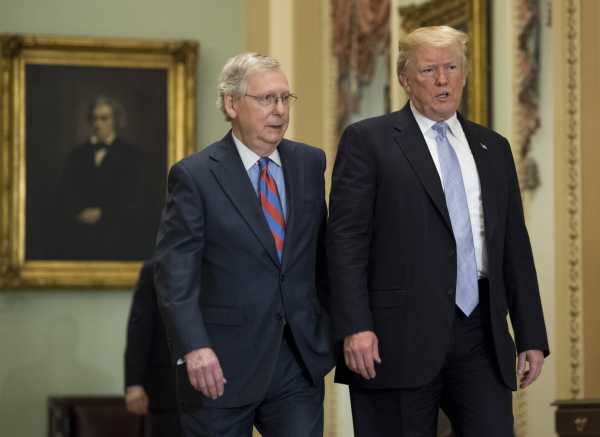
The retirement of the Supreme Court’s swing justice, Anthony Kennedy, sets up an enormously consequential confirmation battle over his replacement in the narrowly divided Senate for later this year.
Kennedy announced he’s stepping down as an active justice on July 31. President Donald Trump has already made clear he’ll choose a replacement relatively quickly. Mitch McConnell said on the Senate floor Wednesday, “We will vote to confirm Justice Kennedy’s successor this fall.” And after McConnell’s rules change last year, only a simple majority is necessary to get a Supreme Court justice through the Senate.
But while Republicans do currently control a majority in the chamber, it’s quite a narrow one. They have 51 seats, meaning they could theoretically confirm a new justice without any Democratic help. But Sen. John McCain (R-AZ) has been absent from Washington all year for health reasons. If McCain remains in his seat but unable to show up and vote, the Senate will effectively be composed of 50 Republicans and 49 Democrats — so, if any one Republican defects in a partisan vote, he or she can sink a nomination.
And with abortion-rights precedents suddenly at stake, all eyes will be on two swing blocs: moderate Republicans and red-state Democrats.
The key Republicans to watch for a Kennedy replacement vote
Crucially, among those GOP senators are two pro-abortion rights moderates: Sen. Susan Collins of Maine, and Sen. Lisa Murkowski of Alaska. Both have also proven willing to buck their party — for instance, they sank Obamacare repeal last year. Both also, however, voted in favor of confirming Neil Gorsuch.
But the stakes were lower for the Gorsuch vote. Since he was filling Antonin Scalia’s seat, his confirmation meant only that the Supreme Court’s ideological makeup would be restored to approximately where it was in February 2016, before Scalia’s death. It was widely understood that, with Gorsuch, the court would still be short of the votes to overturn or badly weaken Roe v. Wade — because Kennedy, though a conservative, had sided with the liberal and moderate justices to uphold it.
Yet the replacement of Kennedy with a staunch conservative would mean the overturning of Roe is a strong possibility. Of course, we do not yet know who Trump will pick, but he’s pledged to select his nominee from a list of people approved by the conservative legal movement who are generally believed to be anti-Roe.
Erwin Chemerinsky, the law dean of UC Berkeley, wrote in 2016 that the replacement of a justice like Kennedy with a conservative would mean there “almost certainly will be a majority to overrule Roe v. Wade and allow states to prohibit abortions.” Jeffrey Toobin, the legal writer for the New Yorker, tweeted that he thinks Kennedy’s replacement by Trump means “abortion will be illegal in twenty states in 18 months.”
This would mean a serious test for Collins and Murkowski — one they have not yet faced. Both seem to sincerely care about women’s reproductive rights. Collins in particular may be concerned about her own reelection in a purple state in 2020.
Some other Republicans, too, are worth watching. Sen. Jeff Flake of Arizona, a vocal Trump critic who’s retiring, has lately made threats to block Trump’s judicial nominees — though few expect him to follow through on them in this case. And Sen. Dean Heller of Nevada is facing a tough reelection in an increasingly blue state this fall — he’s backed the Trump agenda, but could feel the heat.
Finally, one more question is what happens with Sen. John McCain. If he were to lose his battle with cancer, or decide to step down, Arizona’s Republican governor would appoint his replacement. An extra GOP senator would potentially give McConnell more wiggle room.
The key Democrats to watch for a Kennedy replacement vote
Yet the Kennedy replacement battle will put an enormous amount of pressure on red state Democrats too. It’s likely no accident that McConnell wants to hold a vote in the fall, close to the midterms — he wants to put as much pressure on vulnerable Trump Country Democrats as possible.
The main Democrats to keep an eye on are Sen. Joe Manchin (D-WV), Sen. Joe Donnelly (D-IN), and Sen. Heidi Heitkamp (D-ND). All three face difficult reelections this fall in states President Trump won overwhelmingly. All three also voted for Gorsuch last year — though it should be noted that Gorsuch’s confirmation was assured anyway, due to unified Republican support, so the stakes were lower.
As for Sen. Claire McCaskill (D-MO) and Sen. Jon Tester (D-MT), who represent similarly deep-red states, they voted against Gorsuch last year and have generally been more likely to vote against the Trump agenda than the senators detailed above. Sen. Doug Jones (D-AL), in another very red state, will also face scrutiny in the first Supreme Court vote he’ll cast since being elected last year — though unlike the other Democrats mentioned here, he’s not up for reelection until 2020.
Overall, betting on partisanship is generally a good call for today’s polarized Senate. But this is an unusually momentous vote, with consequences that could last for a generation. Individual senators have enormous leverage here — and enormous responsibility, too.
Sourse: breakingnews.ie
0.00 (0%) 0 votes


































